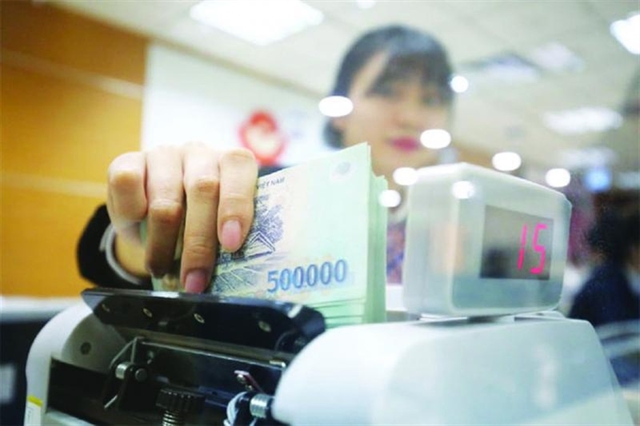With the financial year drawing to a close, banks are busy selling mortgaged properties to resolve bad debts, recovering capital.

With the financial year drawing to a close, banks are busy selling mortgaged properties to resolve bad debts, recovering capital.
On November 22, Vietinbank’s Kien An branch announced auctions to recover four large non-performing loans worth dozens of billions to trillions of dong.
They include a VND27 billion (US$1.17 million) loan owed by the Hon Ngoc Liability Limited Company.
The lender’s Dong Nai branch announced the sale of two properties to recover VND1.2 trillion ($52.17 million) and VND4.3 trillion ($156.95 million) from the Tan Mai Mien Dong Joint Stock Company and Tan Mai Mien Trung Joint Stock Company.
Recently, SHB decided to sell a mortgaged asset worth VND9 billion by an individual customer.
Others like Sacombank, MB, Agribank and BIDV have been announcing a number of auctions of mortgaged properties.
A State Bank of Viet Nam (SBV) spokesperson said since 2012, credit institutions have cleared bad debts worth VND968.89 trillion, recovering VND629.2 trillion or 64.94 per cent by themselves and selling the rest to the Viet Nam Asset Management Company (VAMC) or other organisations and individuals.
The sector’s current bad debt ratio has shrunk to 1.98 per cent.
On average, it recovered VND9.6 trillion worth of bad debts per month between August 2017 and August 2018, double the rate in 2012-17.
Analysts said the amendments to the laws done last year have helped banks and the VAMC better manage bad debts by allowing them to rapidly repossess collateral or assets secured with loans if borrowers default.
Truong Van Phuoc, a member of the Prime Minister’s economic advisory group, said restructuring and handling bad debts have been efficient recently.
But banks have to speed up recovery of bad debts further as debts they had first sold to the VAMC five years ago but not recovered are returning to them this year.
The improved system notwithstanding, bad debt recovery remains a headache for the lenders since liquidating mortgaged assets is still difficult.
They give loans against borrowers’ land use rights and house ownership, but in many cases authorities expropriate the assets or annul the documents.
The heads of some banks said this has significantly affected them, warning this could increase their bad debts.
A wary central bank has instructed credit institutions to carefully study the legal provisions on land use rights and home ownership to get a clear understanding of the possible risks.
It expects them to perfect their internal regulations on lending based on this to minimise risks.
It has also stressed the need for them to keep track of information on land acquisition put out by the local administrations on their websites so that they can take timely and proper measures to avert risks.
Retailers jump into watch market
Despite being a newcomer to the fashion watch market, after entering only this March, Mobile World Group (MWG), which owns Thegioididong.com and Dienmayxanh.com, already accounts for 15 per cent of the market amid record high retail sales of watches.
In September alone, it sold 50,000 across its 100 showrooms.
Smart watches cost $150-400 and fashion watches cost $120-250, meaning average monthly revenue per store was $30,000-45,000, beating the expectations of the company and distributors.
Jewellery retailer PNJ entered the watch market as long ago as in 2012. It too has seen handsome results, and plans to further invest in this segment.
As of October, it had 23 stores, which made a substantial contribution to the company’s turnover in the first 10 months of the year of VND13.4 trillion ($582.4 million). Its after-tax profit was VND935 billion ($40.7 million).
Some other watch retailers have also been expanding rapidly in recent years. Dang Quang Watch, for instance, now has 63 stores in major cities and provinces; Xwatch has 12 showrooms in Ha Noi, HCM City and Quang Ninh.
Doji, another Vietnamese jewelry brand, also entered the market last year and is taking baby steps.
The clamour to enter the market is because of the great potential that exists.
“After observing the fashion watch market, we realised it had real potential,” a PNJ spokesperson told Thoi bao Kinh te Viet Nam (Vietnam Economics Times) newspaper.
The newspaper quoted Tran Thai Son of Viet Dragon Securities Corp as saying: “The watch retail market in Viet Nam is worth around $1 billion, excluding counterfeits and products brought in by hand, which is quite substantial.”
SSI Securities Corporation said the market grew by 300 per cent in the first half of this year, and the rapid growth is expected to continue.
The market is forecast to reach VND200-300 trillion by 2025, 10 times its current size.
An MWG spokesperson said: “The market is very profitable. We don’t see any risks.”
A PNJ executive said the fact that MWG entered the watch market proved his company’s decision to invest further in it is correct. “It is also a good sign for consumers, because it is difficult to find genuine and prestigious watch sellers.”
Retailers like PNJ and MWG also entered the market with a clear advantage. The former, for instance, had a large network of jewellery stores, a modern retail management system and huge amount of customer data, all of which help it save on space and staff costs for selling watches, and selling high-end watches together with expensive jewellery makes commercial sense.
PNJ has outlined a plan to further expand its store network and develop human resources for online retailing of watches from now through 2021. Its online sales now account for 20-25 per cent of its revenue and are rising.
“We believe we are on the right track and will see a breakthrough in terms of revenue and profit in the next couple of years,” PNJ CEO Le Tri Thong said.
At its annual general meeting this year, he said the new plan envisages the watch business contributing VND130 billion a year to revenue.
The company’s market share would increase to 50 per cent by next year, with watch sales rising to three million units.
MWG’s Thegioididong.com accounts for more than half of the country’s mobile phone sales while its Dienmayxanh.com accounts for roughly 45 per cent of consumer electronic sales.
The company is thus confident of developing a watch retail chain very quickly based on its existing network of over 2,000 stores.
Technology-based management, excellent service and authentic after-sale service are MWG’s advantages besides its large customer base.
The company is selling watches through a unique ‘shop-in-shop’ model at its mobile phone and consumer electronics stores.
At these stores, watches are displayed like normal retail products so that shoppers can touch and feel them. It is focusing on VND3-5 million ($130-215) watches and brands such as Michael Kors, Fossil and Casio, which are most favoured by Vietnamese.
Analysts are confident that this business model will work. — VNS





